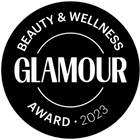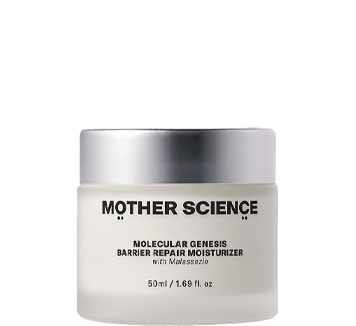How developments in biotech mean that retinol now delivers all the results you want, with fewer side effects.
In the skincare space, retinol is a proven hero ingredient. This vitamin A derivative can boost collagen, reduce acne and fine lines, and improve your skin texture and skin tone. Could retinol get any better? Turns out it can – meet your science-backed new skincare secret, retinol plus biotech.
Biotech – The Newest Way to Use Retinol
Retinol has come a long way since the discovery of retinoic acid in the 1950s. Old-school retinoids were effective but also often caused significant irritation, dryness, and redness – an effect known as retinization. New developments in biotech (biology plus technology) mean that the newest way to use retinol means getting the results you want, with fewer side effects.
Why Biotech should be your new skincare crush:
✔️ Biotech means targeted results: when you’re looking for effective skincare, biotech’s advanced approaches deliver science-backed results.
✔️ Biotech means less irritation: biotechnology means that skincare actives (like retinol) deliver the results you want with fewer side effects.
✔️ Biotech embraces sustainability: these cutting edge technologies can mean more ethical sourcing with less impact on the environment.
As a Biotech brand, Mother Science has spent 6 years researching and developing a new molecule found in skin’s natural microbiome – Malassezin (MAL•UH•SAY•ZIN). When combined with retinol in Retinol Synergist, Malassezin boosts retinol’s benefits while reducing retinization by protecting your skin’s natural barrier.

Malassezin is retinol’s new best friend, and the newest skincare secret that you’ve never heard of. Even though Malassezin is new to the skincare world, it has been present on human skin for millions of years. It’s superpower? Malassezin reduces cell damage from free radicals (unstable molecules), boosts collagen for firmer skin and supports and calms your skin barrier.

How Biotech Ingredients Reduce Skin Irritation from Retinol
One of the main causes of skin irritation from retinol (retinization) is that retinols can damage your skin’s natural protective barrier. For dewy, smooth, glowing skin, you need a healthy skin barrier. That’s why Retinol Synergist combines 0.3% of time-release retinol with skin barrier support from Malassezin and other ingredients.
Here’s how to tell if you have a damaged skin barrier:

Skin issues like hyperpigmentation, acne and fine lines can be frustrating to deal with. We get it – it can be tempting to try every possible solution all at once. Unfortunately, when it comes to your skin barrier health, using too many active ingredients at the same time can leave your skin barrier stressed and vulnerable to breakouts, peeling and infection.
Here’s how the ingredients in Retinol Synergist support skin barrier health:
✔️ Malassezin: reduces cellular damage from free radicals, delivers firmer and smoother skin, and supports your skin barrier to reduce retinization.
✔️ Lipid Concentrate: this concentrated mix of lipids plumps and moisturizes your skin barrier for dewy, healthy skin.
✔️ Encapsulated Retinol: controlled time-release retinol means getting great results with less risk of skin barrier irritation.
✔️Trehalose: a soothing plant sugar derivative that supports your skin barrier by helping your skin retain moisture.
Supporting your skin barrier by reducing the effects of retinization, means that improvements in your skin tone and texture can go hand in hand with maintaining a healthy skin barrier.

How to Use Retinol Synergist
If you’re looking to reduce fine lines and wrinkles, and achieve smoother, brighter skin with fewer side effects, here are the best ways to add retinol into your skincare routine:
Dermatologist Tip #1 – Start Slowly:
Dr Tina Alster, MD, FAAD, a board-certified dermatologist and clinical professor of dermatology at Georgetown University Medical Center in Washington, D.C. is a fan of introducing retinol into your skincare routine slowly[1] to reduce irritation. “I advise clients to … use it every other night to start, slowly building up," she says. "If they don’t do that, they end up irritating their skin."
Participants in our clinical trials for Retinol Synergist experienced little or no irritation to their skin barrier, but we still recommend using the product only 2-3 times a week to start with so that your skin has time to adjust.

Dermatologist Tip #2 – Why Choose Encapsulated Retinol:
Traditional retinols can cause irritation because they immediately impact your surface skin layers. Encapsulated retinol is a newer, less irritating way to deliver retinol. Created with advanced liposomal bio-technology, the retinol is encased in a protective layer made up of moisturizing molecules (skin-barrier-friendly lipids and fatty acids) that dissolve slowly over time.
This controlled-release system allows the active ingredient to go deeper into your epidermis (skin layers) with less irritation. Dr. Penzi, MD recommends[2] encapsulated retinol, especially for sensitive skin, “Traditional retinols can be irritating and cause redness and dryness.[3] The encapsulation mitigates these side effects.”
Here’s why Mother Science uses encapsulated retinol in Retinol Synergist:
✔️ Encapsulated retinol is more stable because the protective coating keeps our retinol effective to the end of the bottle.
✔️ Encapsulated retinol has a moisturizing outer coating that helps it absorb easily into your skin.
✔️ Encapsulated retinol is a controlled-release formula which means it treats both surface and deeper skin layers.
The slow-release technology used by Mother Science Retinol Synergist means that only some of the retinol goes to work immediately on your skin surface, while the rest is released more gradually for deeper, long-term results including improved texture, reduction in dullness, and more even skin tone. Encapsulated retinol also pairs wells with advanced biotech ingredients like Malassezin, working together to boost collagen for firmer skin.

Dermatologist Tip #3 – The Ingredients That Work Best With Retinol:
Dermatologists agree that retinol is best paired with other ingredients that support its function and help protect your skin barrier. “Retinols are the superstars of a skincare regimen, meaning they don’t like to share the stage with many other actives,” says Dermatologist Dr. Azadeh Shirazi.[4] Supporting your skin barrier means using a moisturizer like Molecular Genesis Barrier Repair that contains Malassezin, and other skin repairing ingredients like hyaluronic acid and squalane (a fatty acid).
Here’s how Molecular Genesis Moisturizer pairs well with retinol:
✔️ Growth factors: boost collagen and elastin, for fewer fine lines and firmer skin.
✔️ Copper peptides: firm skin, smooth wrinkles, and reduce redness.
✔️ Hyaluronic acid: plump and hydrate skin barrier.
✔️ Squalane: help skin barrier to retain moisture.
✔️Lipid concentrate: strengthen and hydrate the skin barrier structure.
✔️ Malassezin: restore and repair your skin barrier.
Molecular Genesis Barrier Repair Moisturizer makes an ideal companion to Retinol Synergist – because a nourished skin barrier means smoother, more resilient skin.

Clinically Validated Retinol – Powered by Biotech
When it comes to having your best skin, it’s important to use skincare actives like Malassezin consistently. That’s how to get the best results from Mother Science Products – and why we offer discounted bundles and 10% off all subscription orders. We want the very best for you and your skin.
At Mother Science, we use the most up-to-date technology to create products validated by science and clinical trials. We believe in our products, and we’re confident that you will love them too, but if you’re not completely satisfied, we offer free returns within 30 days of receiving your products.
Questions? Take a look at our FAQ page or reach out to us at hello@motherscience.com.
REFERENCES:
- https://www.aad.org/public/everyday-care/skin-care-secrets/anti-aging/retinoid-retinol
- https://www.mdcsnyc.com/provider/lauren-penzi-md
- https://www.skincare.com/expert-advice/all-expert-advice/what-is-encapsulated-retinol
- https://www.skincare.com/expert-advice/all-expert-advice/what-is-encapsulated-retinol










